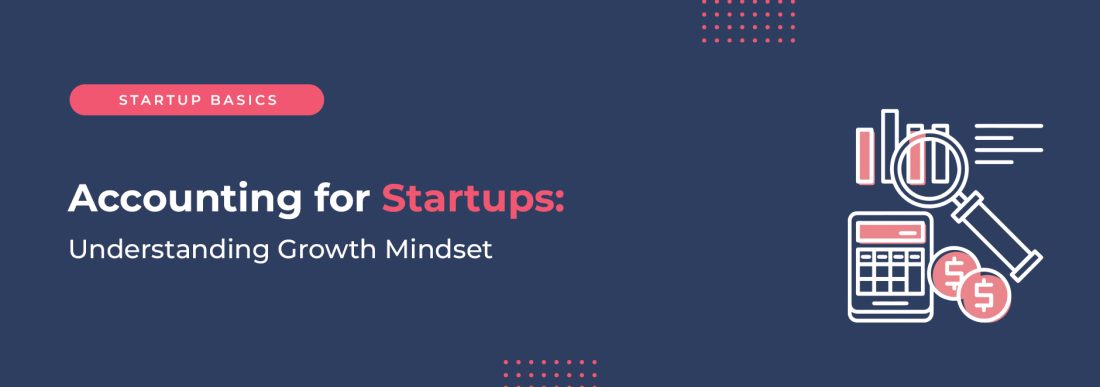Accounting for Startups: Understanding Growth Mindset
Tue 14, 2023 | 20 Min Read


Jump to Sections
Stay updated
with our Blogs
We will keep you updated about our latest blogs
Share This Blog
Startups are businesses founded with the objective of disrupting industries, with superlative growth at the forefront of their strategies. Although startups may initially experience various obstacles related to the attainment of clientele, the most common predicaments they face are the preservation of cash and the prolongation of losses while the development of products and services and initial execution steps towards getting to market characterize the main activities of early-stage startups.
What is Accounting?
Methods of Accounting
The Accounting Process
The Three Main Financial Statements
Income Statement (aka Statement of Profit & Loss, or ‘P&L’): It illustrates the current period’s revenues and expenses that have been incurred by the business. The main headings that are analyzed in this statement are Revenues, Cost of Sales, Gross Profit (immediate profit of the goods sold), Operating Profit (balance remaining following the deductions of operating expenses from the gross profit), and Net Profit/Loss (residual amount after deducting finance charges and taxation from the Operating Profit). The income statement can be for any specified time period, be it monthly, quarterly or annual.
Statement of Financial Position (aka Balance Sheet): It portrays the balances for all assets, liabilities, and equity of the business at a single point in time. It is based on the accounting equation: Assets = Liabilities + Equity, which essentially dictates that the sum of all internal and external funds of the business must be equal to its total assets.
Statement of Cash flows: It describes the total cash inflows and outflows of the business for a given time period, be it monthly, quarterly, or annually, in the same manner as a P&L is prepared. Analysis of cash flows can help one improve the management of the working capital as well as the capital expenditure requirements of the startup. Despite initial short-term successes, weak cash management and an inability to manage cash burn in the critical early times prior to the startup generating revenue at scale have led to the downfall of various startups in the recent past. This leads us to understand the importance of accounting for startups.
Why is Accounting Essential for Startups?
External Financing: As businesses rapidly scale their operations, the need for external funding is likely to arise. Hence, it is vital that the business maintains proper accounting books and records (in accordance with generally accepted accounting standards) and develops realistic, financial-data-supportable, long-term future cash projections and requirements. This will enable the business to pursue and persuade investors to lend funds to or invest in the company, among other requirements.
Working capital: Apart from the borrowing needs, accounting will assist in the optimization of working capital via real-time accurate details of receivables and payables schedules (crucial for the analysis and forecast of cash flows). Also, robust accounting systems, structured and configured properly from the outset, would ensure hassle-free and accurate calculations of various financial totals and balances for the purposes of preparing annual tax returns, compared with a more traditional, manual approach with calculations and the associated review, reconfiguration(s) of figures, and recasting for the purposes of calculating taxable income and ultimately the ending tax owed or owing (which of course is extremely time-consuming).
Financial Ratio: Detailed analysis of the financial statements is of utmost importance for any company, especially for new ventures. The statements may be examined via the use of financial ratios in order to ascertain the company’s performance on various key performance indicators (KPIs), with regard to profitability (profit generation capability of the firm), liquidity (the ability of the business to repay its short-term commitments) and gearing of leverage (analysis of the company’s debt levels).
Budgeting: Another key process for the company is the creation of, and evaluation of, budgets. Budgets are used to predict future cash requirements, establish business strategies and their tactical execution steps, determine the differences between expected and actual costs, as well as the optimization of business processes, initiatives, and investments. Accounting is vital for startups as it allows stakeholders to determine the financial health of the business, forecast future performances and cash needs, to prevent an unsustainable cash burn rate and eventual spiraling out of the business from existence if the pool of cash dries up.
Want to learn about the next steps for growing your business ?
What is Growth Mindset & How it can help Startups?
With the ever-changing business environment, flexibility is a crucial trait for the survival of startups. The growth mindset suggests that positive characteristics such as talent and intelligence can be developed through learning. The growth mindset fuels startups to constantly innovate and develop a positive mindset throughout the entire learning process. For this reason, businesses should always prepare for uncertain times, while showing perseverance to overcome all sorts of difficulties. According to the growth mindset lauders, setbacks should only be seen as temporary speed bumps, opportune for learning ‘what didn’t work’, and should empower one to focus on achieving success. The growth mindset is a key pillar for any startup, as entrepreneurs who lack this trait are unable to tackle risks by preparing for them beforehand and may face difficulties in scaling operations at an optimal rate.
Startups working on the growth mindset principle, focus on creating a network of energetic employees, advocating for customers, and engaging external stakeholders, which work towards ensuring the business prospers even during strenuous times, amid achieving projected goals.
What Role Can Effective Accounting Play in Facilitating a Growth Mindset
Effective accounting can facilitate the growth mindset in several ways.
Variance Analysis: The first step in achieving the growth mindset is through the establishment of business objectives for the future. With the help of accounting, a business can effectively set achievable targets through budgeting and the use of variance and trending analysis. From this, businesses can efficiently learn to reduce costs and maximize revenues, as well as identify trends in all financial aspects for what is working, and as importantly, what’s not.
Snapshot of Business Resources: Accuracy in financial data provides a real-time analysis of the resources available and the capabilities of the business in tackling any cost-side surprises.
Ratio Analysis: Effective accounting enables the analysis of past and present financial performances of the company while allowing the efficient projections of potential future performances, via relative analysis (ratio analysis). The use of ratio analysis allows the management to thoroughly comprehend the reasoning for the prior years’ performances relative to the present. For example, to illustrate the factors that have led to unfavorable deviations in the cash cycle, the management may compare the current cash cycle with yesteryear, and changes in business credit terms. Factors such as the change in payment terms (lax terms at present compared with last year), change in supplier/customer pricing power, and overall change in the general economic environment may become highlighted to the management. Thus, businesses with a growth mindset are able to course correct quickly based on real-time experience and in turn, ensure long-term sustainable success.
What is a Financial Plan?
How to Financially Plan Amidst Uncertainty and its Importance to Startups
Make use of Budgets: Budgets can be prepared using scenario analysis to determine what may occur in the upcoming period, in relation to cash, sales, procurement, and other costs. Frequently setting and evaluating budgets (vis-à-vis actual results) force managers to rectify errors in business processes while ensuring the alignment of business objectives, as well as predetermining the impact of possible unforeseen events. This may ensure that the managers remain proactive, instead of making reactive decisions such as curtailing planned expansions, bonuses, and so on.
Debt Reduction: Similarly, in times of volatile business and economic environments, startups should focus on reducing their reliance on external debt and in turn enhancing internally generated funds and overall productivity, if dark economic clouds are on the horizon. This can be done through in-depth reviews of the financial statements, operating processes, and cost structures, relative to peers and the overall industry. For instance, changes in inventory management through the adoption of just-in-time production may favorably impact profits and working capital requirements, requiring less external debt at any given time, which accordingly reduces the leverage ratio and the risk that the business will be unable to service its debts.
Diversification: One very important aspect to factor in for many small businesses is to review their dependence on a single supplier, customer, and funding base. The main goal here is to reduce reliance on a single supplier or a few large customers, while also exploring various avenues for funding. Therefore, business plans should frequently be revisited to ensure they reflect the current circumstances the company is facing.
Sensitivity Analysis: During uncertain times, entrepreneurs should make use of scenario and sensitivity analysis, to better prepare their ability to absorb shocks. Having a cash forecast on hand for each situation will help them plan and hedge against immediate negative surprises.
Automated Accounting Software: Uncertainty and the frequent requirement for real-time review of the company’s financial position, calls for the need for automated accounting and reporting software and for the technical and professional support that entails.
Entrepreneurs need to focus on thriving in uncertain times while focusing on the core strategic functions of the business. Resultantly, the demand for outsourcing the bookkeeping and accounting functions to a specialist firm, such as Accountimize, arises logically and very naturally.
How Can Accountimize Assist Startups with their Accounting Needs?
- Technological fluency with the best-in-class accounting, bookkeeping & data-management applications,
- Credentialled and certified professionals on staff, working remotely and leveraging the communication tools necessary to operate in a globally-dispersed fashion, and
- A library of best-practices attained, refined, and optimized by some of the most prominent industry leaders and innovative enterprises from which our team members have come.
Book a Discovery call


Stay updated
with our Blogs
We will keep you updated about our latest blogs



